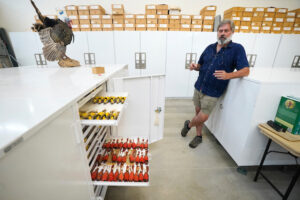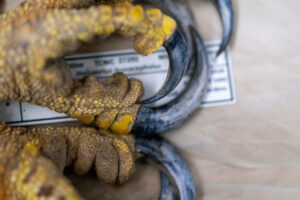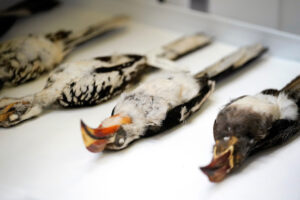To give in support of the Texas Ornithological Research Fund, which was established to develop sufficient resources to allow us to continue to build the Collection of Birds at the Biodiversity Research and Teaching Collections to benefit the public, State and University aspects of our mission; Click here.

The Collection of Birds at the BRTC contains over 34,000 specimens from 59 countries. Holdings include representatives of 1,925 species, 859 genera, and 165 families. The majority of specimens are prepared as skins; however, the collections include nearly 1,500 skeletons, 300 fluid preserved specimens, 400 egg sets and 6000 wings. The Collection also maintains a rapidly growing collection of tissues (over 9,000), blood samples, ectoparasites and endoparasites associated with voucher specimens. Specimen records may be accessed through VertNet. The genetic material for our specimens is curated in parallel and stored in ultra-cold freezers and is also available to researchers by request. To search for specimens with associated tissues, visit the Global Genomic Biodiversity Network site. Our loan policy is available here .

Research projects by faculty, students and staff at Texas A&M University have provided, and continue to provide, most of the material in this collection. However, the collection has grown through acquisition of the ornithology collections of Austin College, Southern Methodist University, Midwestern University and the University of North Texas. Historic and modern collections from the National Parks System (Guadalupe Mountains National Park, Carlsbad Caverns National Park, Padre Island National Seashore) also contribute to the growth of the collection. Recent international expeditions to Armenia, Benin, Democratic Republic of the Congo, Italy and South Africa have increased the number of species and geographic diversity represented in the collection.
In late 2020, the BRTC Collection of Birds engaged in a collaboration to promote a statewide effort to promote dark buildings during peak bird migration, to prevent birds from being lured to city centers where they are prone to collide with windows. The statewide approach includes educating business owners and city managers about the importance of bird friendly design, dimming non-essential lighting, and engaging with volunteers at the local level to conduct surveys to document bird strikes. Casualties that are found on survey routes become specimens at the BRTC, where they can then be used in a variety of research projects. Importantly, these specimens are also used as supporting data to identify where bird-friendly design is most needed. Through this project, the BRTC Collection of Birds has engaged with concerned students, faculty and staff that are collectively working to make changes on our campus. Read more about those efforts here.
Collections are continuing to meet the needs of researchers in an increasing number of fields of study. They are used for answering important questions about birds and our shared environment, and provide a broad benefit to the management and conservation of birds.

The Collection of Birds is willing and able to care for all types of collections. If you collect specimens as part of your research and cannot or do not wish to adequately care for them in the long term, please consider the Biodiversity Research and Teaching Collections as a repository. We gratefully accept such specimens provided they are accompanied by proper documentation and permits (USDA, USFWS, CITES, STATE).
Recent Publications
Wogan, G.O.U., G. Voelker, T. Jain, P. Kaliba and R.C.K. Bowie. 2024. Niche Dynamics Modulate Population Connectivity Between Disjunct Ranges of the Cape Robin-Chat (Cossypha caffra) Supporting An Aridlands Species Pump. Frontiers of Biogeography 17:e132679.
Brooks, D.M., H.L. Prestridge, G. Voelker, and K.A. Arnold. (2023). Specimen records of Sooty Shearwater (Ardenna grisea) from the Gulf of Mexico, with comments on temporal frequency. Bull. Texas Ornithological Soc. 55:136-139.
Gomez, E.A., H.L. Prestridge, and J.A. Smith. (2023). Anthropogenic threats to owls: Insights from rehabilitation admittance data and rodenticide screening in Texas. PLOS One: doi:10.5061/dryad.p8cz8w9wd
Ilahaine, L., R. Colominas-Ciurò, P. Bize, G. Boano, M. Cucco, M. Ferri, G. Masoero, C.M. Meier, M. Pavia, G. Ramello, G. Voelker, I. Pellegrino. (2023). Molecular investigation on infection by haemosporidians in three Western Palearctic species of swift (Apodidae) and their ectoparasitic louse-flies. Parasitology Research.
Nachman, M.W., and 117 co-authors including G. Voelker. (2023). Specimen collection is essential for modern science. PLoS Biol 21(11): e3002318.

